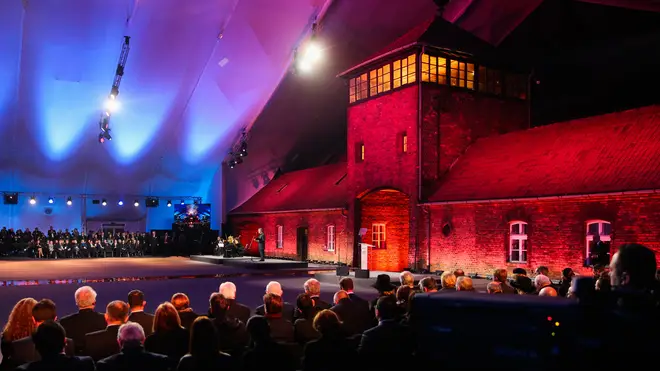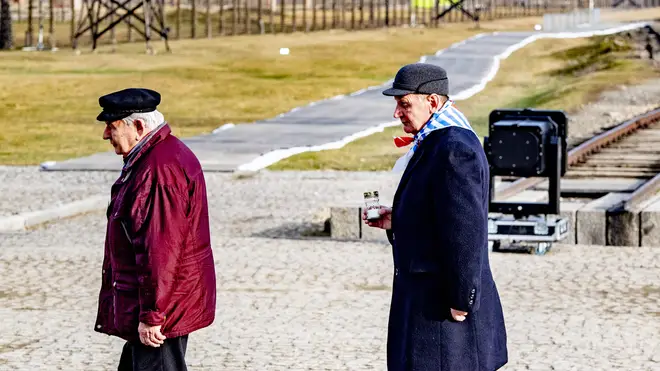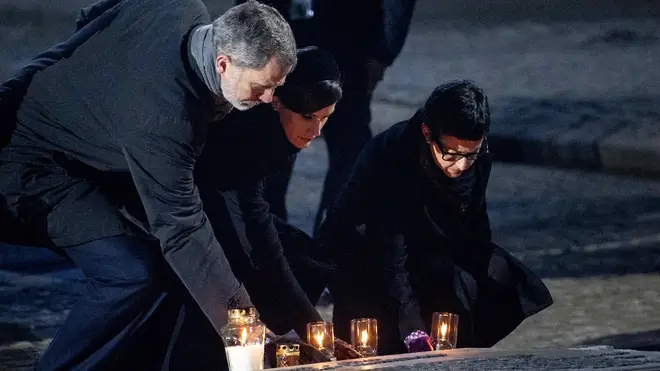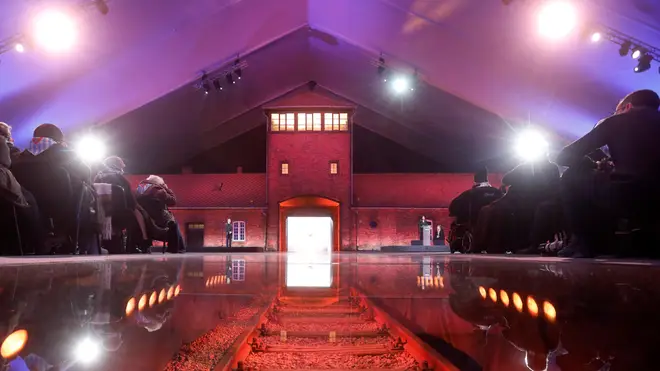
Richard Spurr 1am - 4am
27 January 2020, 17:59 | Updated: 27 January 2020, 19:27

Auschwitz survivors have gathered at the death camp to mark the 75th anniversary of its liberation.
Around 200 survivors of the camp visited on Holocaust Memorial Day, many of them elderly Jews and non-Jews who have travelled to Poland from Israel, the United States, Australia, Peru and elsewhere.
Many lost parents and grandparents in Auschwitz-Birkenau or other Nazi death camps.
They gathered under an enormous, heated tent straddling the train tracks that transported people to Birkenau, the part of the vast complex where most of the murdered Jews were killed in gas chambers and then cremated.
People stood in silence as a Jewish survivor recited Hebrew prayers for the dead, bowing their heads or wiping away tears. Clergymen of other faiths also prayed.

Then, with the famous gate and barbed wire illuminated in the dark, cold evening, guests marched in a procession to place candles at a memorial to the victims set amid the remains of the gas chambers.
Auschwitz was liberated by the Soviet army on January 27 1945.
Most of the 1.1 million people murdered at the camp were Jews, but other Poles, Russians and Roma were imprisoned there.
Some of the Polish survivors walked with Polish president Andrzej Duda through the camp's gate wearing striped scarves that recalled the prison garb they wore more than 75 years ago.

Mr Duda told dignitaries at the commemoration: "We have with us the last living survivors, the last among those who saw the Holocaust with their own eyes.
"The magnitude of the crime perpetrated in this place is terrifying but we must not look away from it and we must never forget it."
David Marks, 91, lost 35 members of his immediate and extended family after they all arrived in Auschwitz from their village in Romania.
He said: "We would like that the next generation know what we went through, and it should never happen again.
"A dictator doesn't come up from one day to the other," Mr Marks said, saying it happens in "micro steps."
He added: "If we don't watch it, one day you wake up and it's too late.
Among those attending Monday's observances at Auschwitz were German president Frank-Walter Steinmeier, Hungarian prime minister Viktor Orban, Ukraine's president Volodymyr Zelenskiy and Israeli president Reuven Rivlin.
Mr Rivlin recalled the strong connection that Israel shares with Poland, which welcomed Jews for centuries.
"The glorious history of the Jews in Poland, the prosperity of which the Jewish community has enjoyed throughout history, along with the difficult events that have taken place on this earth, connect the Jewish people and the State of Israel, inextricably, with Poland and the Polish people," Mr Rivlin said while standing alongside Mr Duda.
London mayor Sadiq Khan was guided through the camp by museum director Piotr Cywinski and viewed a plaque that includes the name of his city after it recently pledged a contribution of £300,000 for the site's preservation.

Organisers of the event in Poland, the Auschwitz-Birkenau state memorial museum and the World Jewish Congress, have sought to keep the spotlight on survivors.
On the eve of the commemorations, survivors, many leaning on their children and grandchildren for support, walked through the place where they had been brought in on cattle cars and suffered hunger and illness and came close to death.
They said they were there to remember, to share their histories with others, and to make a gesture of defiance toward those who had sought their destruction.
For some, it is also the burial ground for their parents and grandparents, and they will be saying kaddish, the Jewish prayer for the dead.
"I have no graves to go to and I know my parents were murdered here and burned. So this is how I pay homage to them," said Yvonne Engelman, a 92-year-old Australian who was joined by three more generations now scattered around the globe.
She recalled being brought in from a ghetto in what was then Czechoslovakia by cattle car, being stripped of her clothes, shaved and put in a gas chamber.
By some miracle, the gas chamber that day did not work, and she later survived slave labour and a death march.
A 96-year-old survivor, Jeanette Spiegel, was 20 when she was brought to Auschwitz, where she spent nine months.
"Young people should understand that nothing is for sure, that some terrible things can happen and they have to be very careful. And that, God forbid, what happened to the Jewish people then should never be repeated," she said.